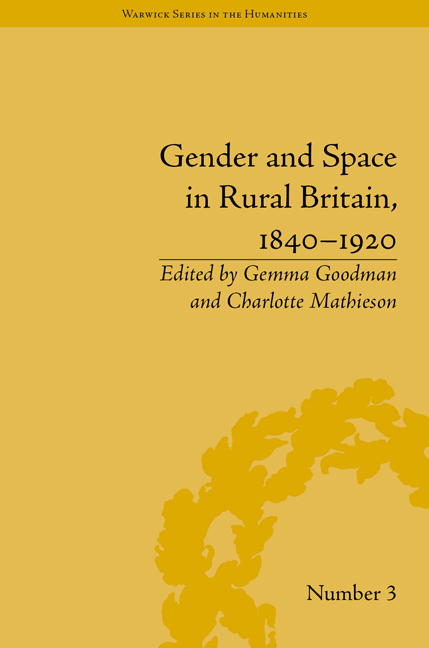Book contents
- Frontmatter
- Contents
- Acknowledgements
- List of Contributors
- Introduction: Gender and Space in Rural Britain, 1840–1920
- 1 Women in the Field
- 2 ‘Between Two Civilizations’: George Sturt's Constructions of Loss and Change in Village Life
- 3 At Work and at Play: Charles Lee's Cynthia in the West
- 4 ‘Going Out, Going Alone’: Modern Subjectivities in Rural Scotland, 1900–21
- 5 ‘Drowned Lands’: Charles Kingsley's Hereward the Wake and the Masculation of the English Fens
- 6 ‘Wandering Like a Wild Thing’: Rurality, Women and Walking in George Eliot's Adam Bede and The Mill on the Floss
- 7 ‘I Never Liked Long Walks’: Gender, Nature and Jane Eyre's Rural Wandering
- 8 Gertrude Jekyll: Cultivating the Gendered Space of the Victorian Garden for Professional Success
- 9 From England to Eden: Gardens, Gender and Knowledge in Virginia Woolf's The Voyage Out
- 10 The Transnational Rural in Alicia Little's My Diary in a Chinese Farm
- Notes
- Index
7 - ‘I Never Liked Long Walks’: Gender, Nature and Jane Eyre's Rural Wandering
- Frontmatter
- Contents
- Acknowledgements
- List of Contributors
- Introduction: Gender and Space in Rural Britain, 1840–1920
- 1 Women in the Field
- 2 ‘Between Two Civilizations’: George Sturt's Constructions of Loss and Change in Village Life
- 3 At Work and at Play: Charles Lee's Cynthia in the West
- 4 ‘Going Out, Going Alone’: Modern Subjectivities in Rural Scotland, 1900–21
- 5 ‘Drowned Lands’: Charles Kingsley's Hereward the Wake and the Masculation of the English Fens
- 6 ‘Wandering Like a Wild Thing’: Rurality, Women and Walking in George Eliot's Adam Bede and The Mill on the Floss
- 7 ‘I Never Liked Long Walks’: Gender, Nature and Jane Eyre's Rural Wandering
- 8 Gertrude Jekyll: Cultivating the Gendered Space of the Victorian Garden for Professional Success
- 9 From England to Eden: Gardens, Gender and Knowledge in Virginia Woolf's The Voyage Out
- 10 The Transnational Rural in Alicia Little's My Diary in a Chinese Farm
- Notes
- Index
Summary
Although Jane Eyre begins by proclaiming that she ‘never liked long walks’, one of the most peculiar and memorable episodes of Jane Eyre (1847) finds the novel's heroine fleeing Thornfield to wander the English countryside, nearly perishing of exposure and hunger. This episode is notable not only for its drama, or for the irony of the once-indoorsy Jane's situation, but in that Jane nearly dies in the midst of the very natural world that has been strongly and repeatedly used to characterize her as something more (or less) than human herself. Throughout the novel Jane shows an innate sensitivity to and association with the natural world, and particularly in the interviews with Rochester that immediately precede her crisis, Jane is described in terms that are far more wild and nature-based than human. Her flight from Thornfield and her subsequent wandering, however, throw this natural characterization into a deadly crisis. Jane nearly dies of exposure; the poetic language that had turned her into a creature of nature is swiftly undermined, and any romance in Rochester's characterization of Jane as a bird is undone when, starving, she eats porridge meant for a pig.
Jane's affiliation with nature is not simply a romantic fantasy imposed by Rochester: entwined throughout Jane's turn to nature and her traumatic experience in it are practical questions of her own economic status.
- Type
- Chapter
- Information
- Gender and Space in Rural Britain, 1840–1920 , pp. 103 - 116Publisher: Pickering & ChattoFirst published in: 2014



